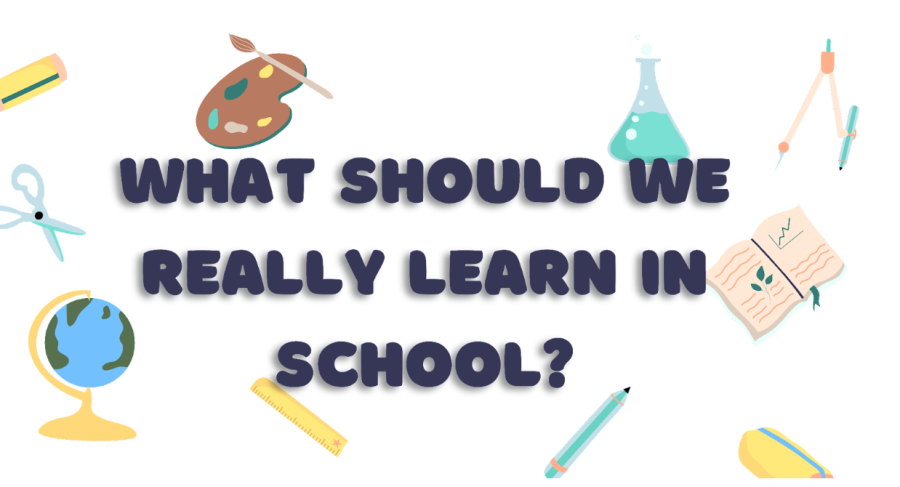What should we really learn in school?
October 25, 2022
During my 12 years of school, I’ve learned countless things: why the American Revolution started, what the derivative of a function is, and how to use an Oxford comma.
Don’t get me wrong, I’m very grateful that I’ve grown up with a solid education and teachers that have taught me well, but I would feel even more prepared for my future if I learned some practical skills that I could use in my everyday life.
The desire to learn more useful skills has only grown stronger since starting my senior year, shifting to a college mindset and seeing that everything I’ve been anticipating since I was younger is suddenly becoming the reality; I realized that there are so many things I need to learn this year on top of calculus, physics, and psychology.
No matter what you do after graduation, everyone should enter the real world knowing how to take care of themselves and be responsible. I’m not just talking about the basic needs like doing laundry and getting food (though of course, those are important too), but what would be really helpful to know is how to create a budget and manage my finances, take care of my mental and physical health, and overall how to be a successful, independent adult.
For all of the time we spend at school, it’s only fair that we are taught how to be well-rounded, prepared people.
A course that the school does offer is Consumer Education, which covers a lot of the important financial aspects needed for adulthood, including managing loans, taxes, insurance, and how to make informed purchases. Having this class built into the school day might be a more efficient way to educate students on these crucial skills. This class used to be mandatory as a graduation requirement, but now the civics credit can be fulfilled in other ways. Switching back to make this a requirement for high school seniors would be a good bridge into the real world and keep this information fresh in their minds after graduation.
Aside from financial responsibility, there are other practical skills that might not even cross people’s minds that need to be taught before entering the real world.
One that stands out to me is media literacy and understanding where your information is coming from. As you grow up, relying on the media for news becomes more and more standard, but if you’re using untrustworthy or biased sources, your understanding of current events may not be as realistic or open-minded as you may think.
Another thing that goes along with that is cybersecurity. Nowadays, our phones hold everything about us. Learning about common scams or the different ways to protect ourselves online is crucial in keeping your information secure. Having a course that touches on this subject could teach you how to guard your information and better prepare you to stay secure.
Another important aspect of adulthood that students should know is how to manage their physical health. Teaching basic skills like disinfecting wounds, or treatments for a cold or stomach bug can save trips to the doctor and better prepare students for when the inevitable time comes that they get sick. Physical health also means knowing how to get active. Many students stop participating in their childhood sports in college, making them less active than they were growing up. Figuring out how to include physical activity in your busy schedule ensures the strength and endurance needed to be a healthy adult.
Aside from physical health, mental health and self-care is another dire topic that needs to be talked about more. Mental health is touched on in some wellness classes, but many students would argue that it still has a huge stigma around it and needs to be an open conversation for young adults. Learning about stress management skills, how and where to get help when you need it, and how to maintain healthy and safe relationships would clear up a lot of issues that come up later in life. Life after high school is a big change on its own, so building these skills into classroom education may relieve some of that anxiety.
While school prepares you for the future in a variety of ways, there are still some basic life skills that many students leave high school without being taught about. Having these lessons built into the school curriculum would ensure that all students have equal opportunities to feel prepared for the real world.







